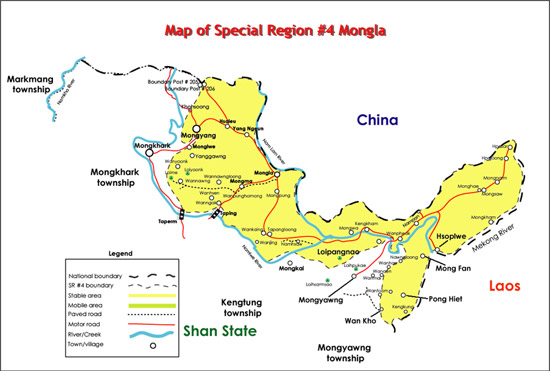Burma Army delegates at the 16 January meeting in Taunggyi had demanded the Shan State Army (SSA) ‘South’ pull out its troops from Shan State East, particularly from Mongyawng township, where Burma, China and Laos meet, according to SSA spokesman Maj Lao Hseng.

The SSA in turn wanted the Burma Army to withdraw its units from Homong (opposite Maehongson) and Monghta (opposite Chiangmai). Both sides had agreed to refer to their respective superiors to decide on the matter.
Mongyawng, 2,754 square miles (7,050 square kilometers), is also located alongside the international river Mekong.
“Nothing to be surprised about,” commented a former Communist officer living at the Sino-Burma border town of Mongla, where the National Democratic Alliance Army (NDAA) is based. “They (the Burma Army) wanted Mongla out too.”
Better known as Mongla group, the NDAA roughly occupies half of the total area of the township. It was pushed out of its two bases: Wan Kho and Pong Hiet, along the Mekong last year, but had refused to budge from the last two: Mong Fan and, more importantly, Hsop Lwe (known to Mongla as Hsop Khong) river port.
The ex-Communist Party of Burma (CPB) officer, who requested anonymity, asked rhetorically, “Who will want to leave Mongyawng once he’s there? The place is highly fertile, is known to possess several precious natural resources (iron, coal, silver etc.) and, moreover, shares border with China and Laos. Additionally, anyone who has Mongyawng has easy access to Thailand and, through it, to the outside world.”
“The Art of War” by China’s warrior-philosopher (BC 551-467), calls an area which forms the key to three contiguous states as “intersecting ground” and declares “he who occupies it first has most of the Empire at his command.” On such ground, he advises, “join hands with your allies.”
One of the treatise’s commentators, Ho Yanxi, also suggests. “First occupy this ground, and the people will have to go with you. So if you get it, you are secure. If you lose it, you are in peril.”
Meng Shi, meanwhile, has the same idea as the author: “On intersecting ground, if you establish alliances, you are safe. If you lose alliances, you are in peril.”
The ex-CPB official has his last words: In the short run, Mongla will be able to defend itself, with the assistance from the Wa. But in the long run, it will feel secure only if all three can stay close together.
“So my question to the SSA is: Why did you ask Naypyitaw its consent to set up your main offices in Homong-Monghta instead of Mongyawng?”
The SSA’s Military Region #1 is active in Shan State East, including Mongyawng.


